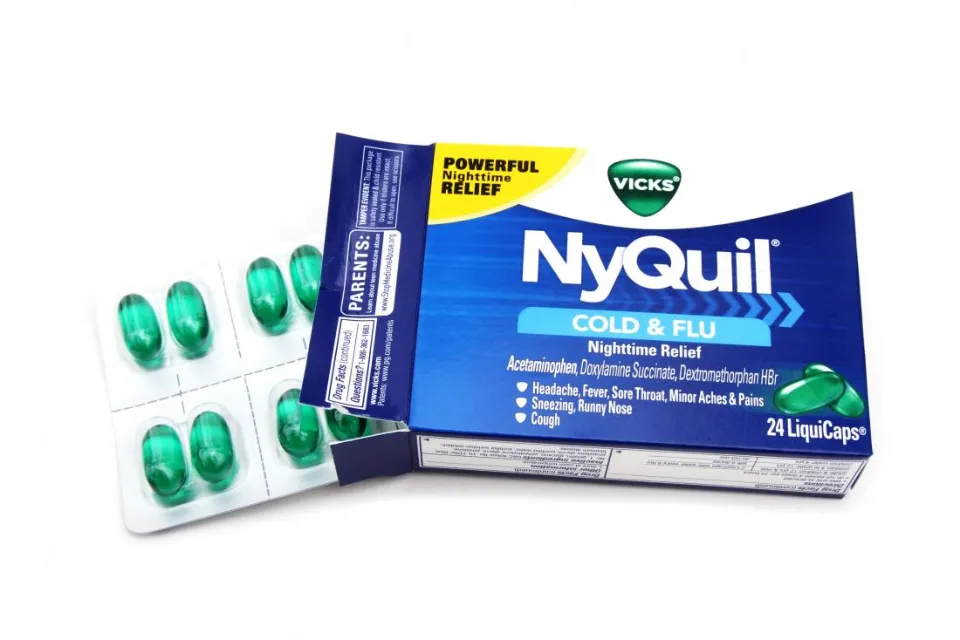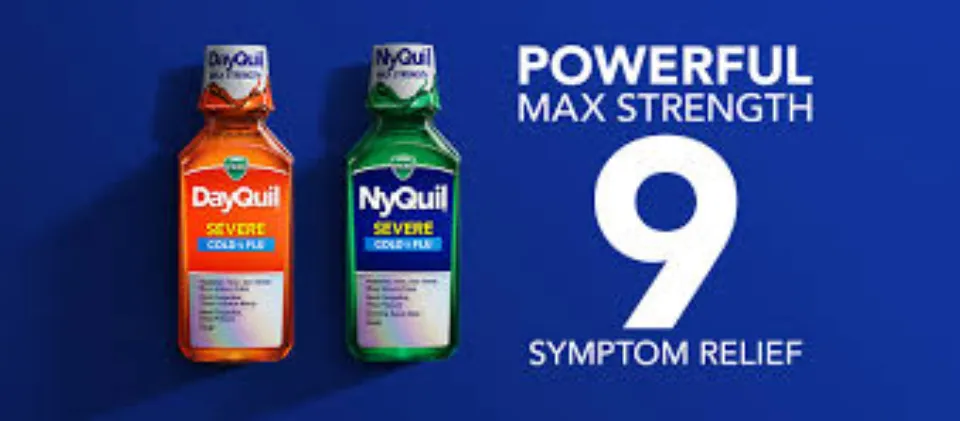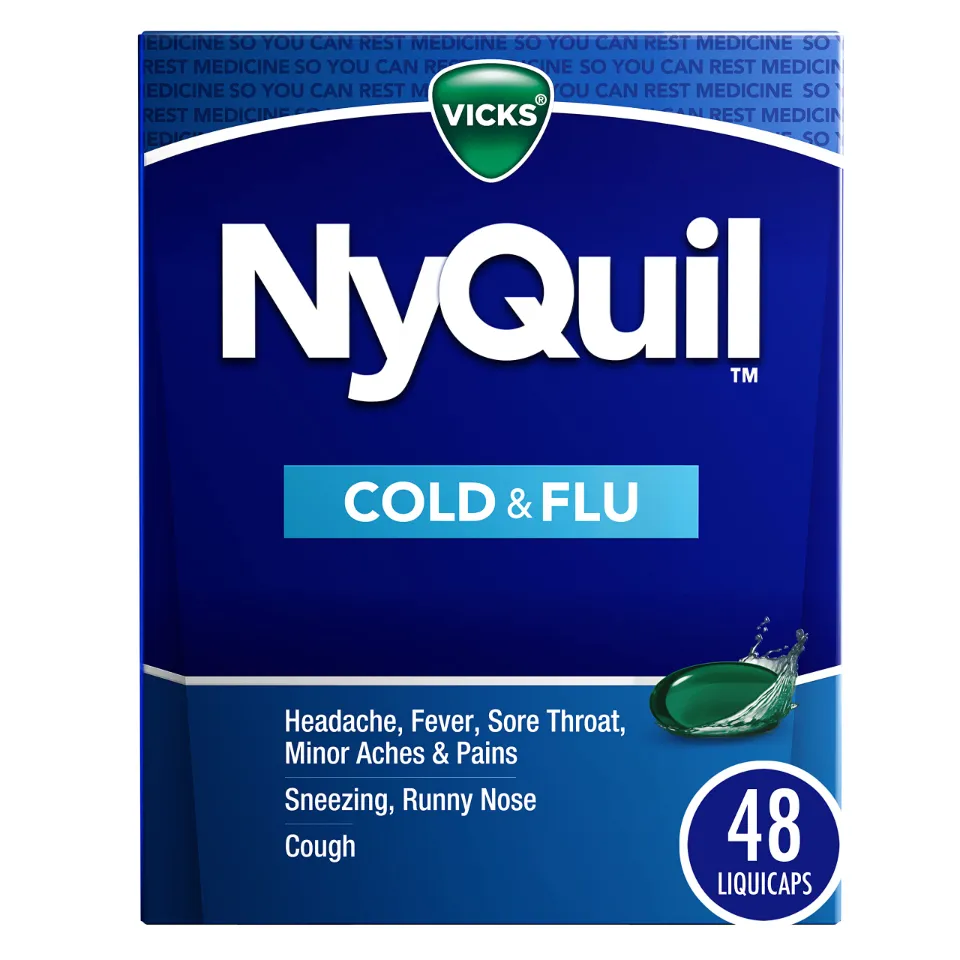I have been taking NyQuil to help me sleep for a few nights now. I occasionally get up in the middle of the night and feel like taking more medication. In the middle of the night, is it alright to take another one? How frequently is it okay to take it?
NyQuil products can be taken every four to six hours. In a 24-hour period, you shouldn’t take more than 4 doses.
Find out if NyQuil is the right choice for you and your symptoms by reading on.
What is NyQuil?
There are several different NyQuil products on the market, including:
- NyQuil Cold & Flu
- NyQuil Cold & Flu Severe
- NyQuil VapoCOOL
- NyQuil Cough + Congestion
- NyQuil HBP
The ‘original’ NyQuil, as stated above, contains three ingredients:
- Acetaminophen – Pain Reliever
- Dextromethorphan – Cough Suppressant
- Doxylamine – Sedating Antihistamine
NyQuil ‘Severe’ add phenylephrine, a nasal decongestant.

The Effects of Nyquil
Nyquil Cold and Flu is a combination of three medications:
- Acetaminophen is an analgesic that relieves pain and lowers fever by stopping the production of certain chemicals in the brain that cause both pain and fever.
- Dextromethorphan is a cough suppressant that works in the part of your brain that makes you cough, calming it down and telling your body to cough less.
- Doxylamine is an antihistamine that works by blocking histamine, a natural chemical in your body that causes congestion, sneezing, and wakefulness.
Temporarily relieves common cold and flu symptoms, including:
- Cough
- Sore throat
- Headache
- Minor aches and pains
- Fever
- Runny nose
- Sneezing
Side Effects of Nyquil
There could be symptoms like fatigue, dizziness, blurred vision, nausea, constipation, or a dry mouth, nose, or throat. Inform your doctor or pharmacist right away if any of these effects persist or get worse.
Remember that if your doctor has prescribed this medication to you, it is because they feel that it will benefit you more than it will harm you. Many people who use this medication report no significant side effects.
Inform your doctor immediately if you experience any severe side effects, such as mental or mood changes (such as confusion or hallucinations), difficulty urinating, a fast or irregular heartbeat, or a seizure.
It is extremely unlikely that this medication will cause a severe allergic reaction. However, seek immediate medical attention if you experience any serious allergic reaction symptoms, such as a rash, itching or swelling (especially of the face, tongue, or throat), extreme dizziness, or difficulty breathing.
How Often Should You Take Nyquil?
Oral Liquid
- Adults and children 12 years and older: 30 mL (2 tablespoons) taken orally every six hours is the typical dose. Unless your provider specifically instructs you to do so, do not exceed 120 mL (8 tablespoons) in a 24-hour period.
- Children 4-11 years old: Specify to your child’s provider.
- Children 3 years and younger: Don’t use.

Oral Capsules
- Adults and children 12 years and older: The usual dosage is 2 capsules taken orally with water every 6 hours. If your provider has not specifically instructed you to take more than 8 capsules in a 24-hour period, do not.
- Children 4-11 years old: Ask the provider of your child.
- Children 3 years and younger: Don’t use.
How Long Does It Take for Nyquil to Work?
Nyquil Cold and Flu typically works within 30 minutes. Given that symptom relief lasts roughly 6 hours per dose, you’ll need to take it every 6 hours.
Pharmacist Tips for Nyquil Cold and Flu
- If using the liquid, shake the bottle well before using. Use the supplied measuring cup, spoon, or syringe to measure your dose. You might take too much Nyquil Cold and Flu if you use standard teaspoons.
- When taking Nyquil Cold and Flu, stay away from alcohol and other sedatives as they may make you feel more sleepy and lethargic. Until you know how this medication affects you, use caution when driving or performing other tasks that call for alertness. When combined with acetaminophen-containing medications, alcohol increases the risk of liver damage.
- If you have taken a monoamine oxidase inhibitor (MAOI) within the previous 14 days, avoid taking Nyquil Cold and Flu as this may increase your risk of developing the potentially fatal side effect known as serotonin syndrome.
- The intended use of Nyquil Cold and Flu is only transient. If your sore throat persists for more than two days, if your cough persists for more than seven days or stops and starts, if your fever persists for more than three days, you should stop using this medication and speak with your doctor. These could be symptoms of an illness that Nyquil Cold and Flu won’t be able to treat.
- Nyquil Cold and Flu should not be taken if you experience any redness, swelling, new symptoms, or worsening of any existing symptoms. Instead, contact your healthcare provider.
- Never give your child Nyquil Cold and Flu to induce sleep.
- Many over-the-counter and prescription medications contain acetaminophen, dextromethorphan, and doxylamine. To prevent an overdose (characterized by symptoms such as blurred vision, dry mouth, difficulty urinating, hallucinations, breathing difficulties, yellowing of the skin or eyes, and stomach pain), check to see if you aren’t taking more of each medication than is advised. If you think you or your child has overdosed, call a Poison Control Center right away at 1-800-222-1222.
- If you are currently taking or have recently taken an MAOI, such as selegiline (Eldepryl) or phenelzine (Nardil), do not take Nyquil Cold and Flu. This combination can cause dangerous changes to your blood pressure. If you have taken an MAOI in the past 2 weeks, contact your provider for other options to treat your symptoms.
Conclusion
NyQuil products can be taken every four to six hours. In a 24-hour period, you shouldn’t take more than 4 doses.
FAQs
Will Nyquil Cold and Flu Make Me Sleepy?
Consequences of Nyquil Cold and Flu include sleepiness. This is because the antihistamine (doxylamine) can make you sleepy. Be cautious when driving or performing other tasks that call for alertness until you know how this medication affects you.
Can I Drink Alcohol While Taking Nyquil Cold and Flu?
Alcohol shouldn’t be consumed at all while taking Nyquil Cold and Flu. The side effects of Nyquil Cold and Flu include drowsiness and decreased alertness. You will become more sleepy and less alert if you consume alcohol while taking this medication. Your risk of suffering serious injuries from accidents like slips and falls and motor vehicle collisions may increase as a result. Your risk of liver damage increases if you consume alcohol while taking acetaminophen-containing medications.



